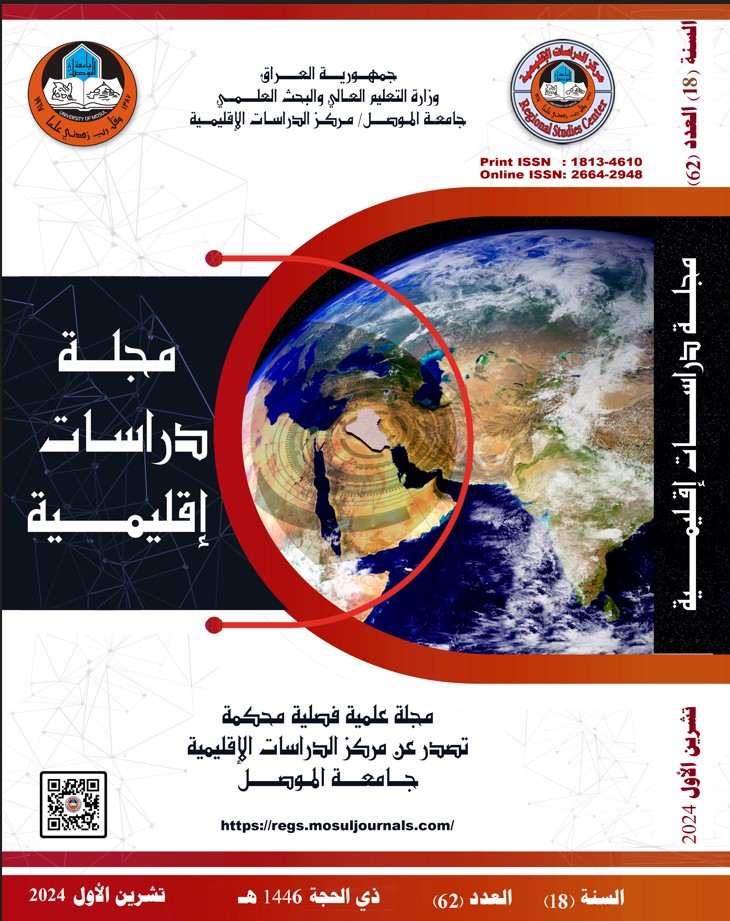Abstract
The normalization agreements signed by the UAE, Bahrain, Morocco, and Sudan with Israel constituted an important shift and change in the reality of Arab-Israeli relations and had Arab and regional impacts and repercussions. The research aims to study the normalization agreements that were signed in 2020, the reasons behind that, the most prominent contents of those agreements, Iran\'s position on them, and the repercussions of that position on Iran. It is an attempt to strengthen the aspect of studies dealing with Arab-Iranian relations, specifically Iran\'s policy and position on normalization agreements with \"Israel\", as it is one of the new topics in this field. The research included four themes, the first of which was Iran and initiatives to end the Arab-Israeli conflict until 1990. The second dealt with Iran\'s position towards the Madrid Conference in 1991, the Oslo Agreement in 1993, and the Jordanian-Israeli peace treaty in 1994, while the involved with Iran and normalization agreements in 2020, and the fourth included normalization agreements and their repercussions on Iran. The research came out with several results, the most important of which is that the normalization agreements were an important shift in the region, and they had repercussions and were a reason for Iran\'s rejection and opposition to them, especially those signed by the UAE and Bahrain due to their geographical location in the Arabian Gulf region and their proximity to it, so Iran considered them a direct threat to its national security, because \"Israel\" was able to find a foothold in the Arabian Gulf region, and this was a reason for Iran to adopt a policy aimed at countering this threat in various ways and means.
Keywords
Iran; normalization agreements; Abraham Accor
Abstract
شكلت اتفاقيات التطبيع التي وقعتها كل من الامارات والبحرين والمغرب والسودان مع \"اسرائيل\" تحولا وتغييرا مهما في واقع العلاقات العربية-\"الاسرائيلية\"، وكان لها تأثيرات وتداعيات عربية واقليمية. يهدف البحث الى دراسة اتفاقيات التطبيع التي تم التوقيع عام 2020، والاسباب التي وقفت وراءها، وأبرز ما تضمنته تلك الاتفاقيات، وموقف إيران منها وتداعيات ذلك الموقف عليها. وتكمن في محاولة تعزيز جانب الدراسات التي تتناول العلاقات العربية - الإيرانية وبالتحديد سياسة إيران وموقفها من اتفاقيات التطبيع مع \"اسرائيل\" كونه من المواضيع الجديدة في هذا المجال. وتضمن البحث اربعة محاور الأول إيران ومبادرات انهاء الصراع العربي- الاسرائيلي حتى عام 1990. وتناول الثاني موقف إيران من مؤتمر مدريد1991 واتفاق اوسلو1993ومعاهدة السلام الاردنية – الاسرائيلية 1994، فيما عالج الثالث إيران واتفاقيات التطبيع عام 2020، وتناول الرابع اتفاقيات التطبيع وتداعياتها على إيران. وقد خرج البحث بنتائج عدة اهمها ان اتفاقيات التطبيع كانت بمثابة تحولا مهما في المنطقة، وكان لها تداعيات وكانت سببا في رفض ومعارضة إيران لها وخاصة تلك التي وقعتها كل من الامارات والبحرين بحكم موقعهما الجغرافي في منطقة الخليج العربي وقربهما منها، لذلك عدتها إيران بمثابة تهديد مباشر لأمنها القومي، لان \"اسرائيل\" تمكنت خلالها من ايجاد موطئ قدم لها في منطقة الخليج العربي، وكان ذلك سببا في اعتماد إيران لسياسة هدفها مواجهة ذلك التهديد بطرق ووسائل مختلفة.
Keywords
إيران؛ اتفاقيات التطبيع؛ اتفاقيات إبراهيم؛ ال
